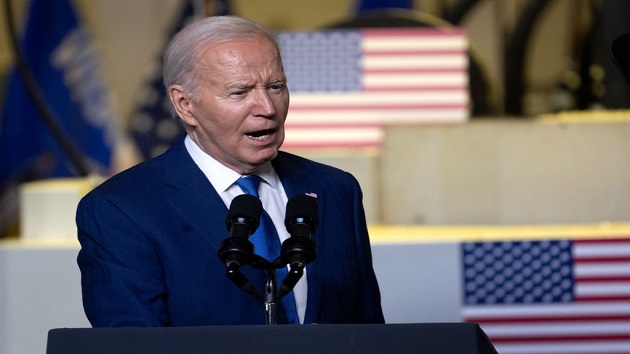
(WASHINGTON) — President Joe Biden is expected to quadruple tariffs on electric vehicles from China from roughly 25% to 100%, and raise other tariffs on key industries including semiconductors, solar, and batteries in an announcement Tuesday, according to a source familiar with the decision.
The action has implications for the 2024 presidential election, as Biden aims to bolster his image as being tougher and smarter on China than former President Donald Trump. In key swing states, Biden has vowed to protect American workers from foreign competition and said last month in Pennsylvania that he would significantly raise steel tariffs on China.
The decision was made after a yearslong-required review of the tariffs that Trump imposed on some $300 billion of imports. Most of those Trump-era tariffs will remain in place.
By implementing a steep increase on EV tariffs, the Biden administration aims to prevent a flood of cars made in China from hitting the U.S. market — a market China has not been a significant player in up to this point.
The level of the tariffs on the additional sectors were not clear as of Monday.
Trump has said he would consider imposing tariffs of 60% or more on all Chinese imports and mocked Biden’s plan during his rally in New Jersey this weekend.
“He says he’s going to put a 100% tariff on all Chinese electric vehicles. Isn’t that nice?” Trump said. “Biden should have done this four years ago.”
The Biden administration claims its approach is more targeted and strategic than Trump’s approach.
President Biden has focused on improving domestic manufacturing and increasing green energy investments during his administration. The tariffs point to growing concerns that overproduction of these kinds of goods by China could significantly hurt his agenda – particularly in an election year when both candidates are pledging to be tough on China.
But some economists warn that increasing tariffs will inflame tensions with China, increase costs to consumers, and worsen inflation.
Ian Bremmer, the president and founder of Eurasia Group, a political risk research and consulting firm, said the higher tariffs on EVs could complicate Biden’s climate agenda.
Bremmer said that “Chinese vehicles are far better on the EV side than anyone else out there.”
“The interesting political point here is that Biden is meant to be the pro-climate president,” Bremmer said. “But we don’t support reducing emissions when it comes at the expense of American labor. And we don’t care if that means it’s less competitive and the Americans are going to have access to more expensive, low quality electric vehicles. That’s the message that they’re sending.”
Tesla CEO Elon Musk said in his company’s earnings call earlier this year that Chinese car companies are the “most competitive car companies in the world.”
“Frankly, I think if there are not trade barriers established, they will pretty much demolish most other car companies in the world,” Musk added.
During her visit to China last month, Treasury Secretary Janet Yellen warned about growing investments in “new” industries targeted by the PRC’s industrial policy,” including electric vehicles, lithium-ion batteries and solar.
“China is now simply too large for the rest of the world to absorb this enormous capacity. Actions taken by the PRC today can shift world prices. And when the global market is flooded by artificially cheap Chinese products, the viability of American and other foreign firms is put into question,” Yellen said in press conference remarks in China.
“We’ve seen this story before. Over a decade ago, massive PRC government support led to below-cost Chinese steel that flooded the global market and decimated industries across the world and in the United States. I’ve made clear that President Biden and I will not accept that reality again,” she added.
Copyright © 2024, ABC Audio. All rights reserved.
